|
|
|
My understanding was that basically all non-ULV laptop CPUs run right up to the thermal limit. The laptop's cooling solution essentially determines the speed of the CPU. So it's not the temperature that matters, but the clock speeds the chip can hit when at that max temperature. If you're hitting something at or close to Intel's spec for the CPU, then there's nothing to worry about. If your CPU can hit and hold its max frequencies at 100 degrees, then any extra cooling capacity is wasted expense and weight from the manufacturer's perspective. It doesn't result in any extra performance. The CPU is designed and rated to run at 100 degrees indefinitely so there are no longevity concerns either.
However it does sound like this particular laptop's cooling system isn't sufficient to get the most out of the CPU as the clock speeds are backing off when you hit 100 degrees. If it feels like the fans aren't really hitting their max speed, see if there's a TDP limit in the BIOS you can raise. Otherwise repasting is basically all you can do short of requesting a different laptop.
Jase2985:
is it a single core load in that last picture?
looking at the load on the core next to it, considering its about the same and the temp is 35deg different there could be something wrong
But i9's run notoriously hot in desktops, and that's only going to get exaggerated by putting one into a laptop.
Interesting findings below, If i stress the entire CPU, it will happily run at ~67W, far exceeding the 45W TDP (but throttled back quite hard on frequency to keep from exceeding 100c), but if i stress via a single thread (load keeps bouncing around the cores), the CPU can only get about 32 - 36W of heat out (again throttling back frequency, but not as hard as with the multicore run).
So cooling seems to be the performance constrain regardless.
For comparison:
Idle, well with a bunch of software open (CPU power saving disabled in the BIOS so it is not throttling back the frequency)
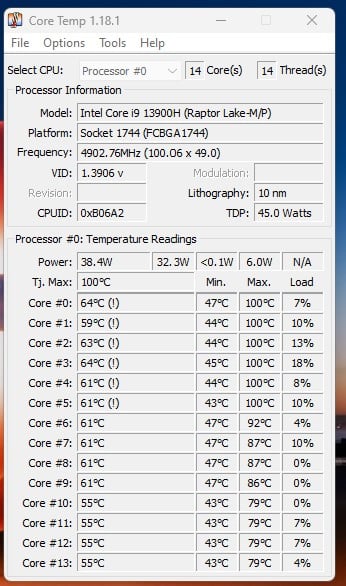
Single core stressor: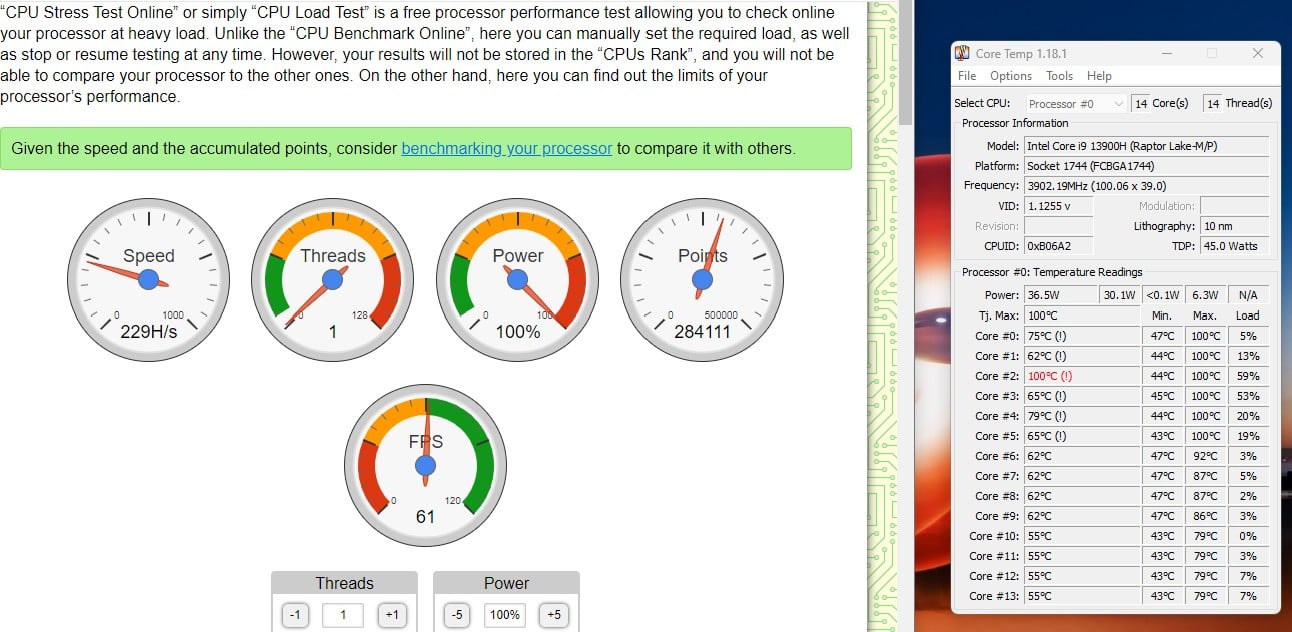
Multicore stressor:

cddt:
If you're doing something computationally heavy, is a laptop the best solution?
Most of the sites I am working on are smaller, but was working on a large site last night, and the runs are taking 5+ minutes. Not to long to be a deal breaker, but long enough that I want to eek out better performance If I can.
I work from home most of the time (and from the office ~3 days a fortnight), and do a bit of travel, so being mobile is of great value. On the thread where I was discussing this purchase, getting a desktop and remoting into it was suggested. Perhaps in hindsight I should have given that more though. That said there is something more simple about just running a single machine.
xpd:
Have you asked other owners of the same model laptop what their temps are ? Ask in Reddit or somewhere, and you'll get some more experiences with that model.
I have just given this a crack
allio:
My understanding was that basically all non-ULV laptop CPUs run right up to the thermal limit. The laptop's cooling solution essentially determines the speed of the CPU. So it's not the temperature that matters, but the clock speeds the chip can hit when at that max temperature. If you're hitting something at or close to Intel's spec for the CPU, then there's nothing to worry about. If your CPU can hit and hold its max frequencies at 100 degrees, then any extra cooling capacity is wasted expense and weight from the manufacturer's perspective. It doesn't result in any extra performance. The CPU is designed and rated to run at 100 degrees indefinitely so there are no longevity concerns either.
However it does sound like this particular laptop's cooling system isn't sufficient to get the most out of the CPU as the clock speeds are backing off when you hit 100 degrees. If it feels like the fans aren't really hitting their max speed, see if there's a TDP limit in the BIOS you can raise. Otherwise repasting is basically all you can do short of requesting a different laptop.
Good to know I'm not going to end up cooking the CPU, and so this is just a performance concern.
Testing with a multi thread stressor above indicates my laptop can easily exceed the 45W TDP when running multicores (but still hits ~100C and throttles hard). It is just the single thread situation where it can only get 32W - 35W of heat out (again throttling due to cores hitting ~100C).
Not really any usefull settings in the BIOS. I did turn CPU power saving off, which effectively generates enough heat to keep the fans on medium all the time. Means no noticeable lag in performance before the load going on and the fans ramping up. (likely will turn that one back on to avoid destroying my battery life).
In terms of requesting a different laptop. I chose this one (and it was north of $4k) Anything better is going to be north of $6k, and will have the the HX series processer that (at the $6k pricepoint will be a i7) has worse single core benchmark scores, but more cores.
Suggest I am going to need to make do with this one, until something dramatically better comes onto the market.
Considering getting a high end cool pad to put the laptop on at home, perhaps this one. Generates positive air pressure under the laptop to force more (filtered) air through the cooling fans.
https://www.amazon.com/IETS-Turbo-Fan%EF%BC%885-5inch-Diameter%EF%BC%89-14-1-19-3-Adjustable/dp/B0CDC3KBC1?ref_=ast_sto_dp&th=1
At the end of the day the i9-13900H is essentially the same processor as the i5-13600, which is a desktop-class processor that happily runs for hours at 65 W. The design of the laptop will be to dissipate 45 W at most, so you will always be limited by thermal restrictions.
And remember, power usage scales according to the square of the frequency, so when you have a heavy single-core workload, it will boost the frequency that one core in order to offer maximum performance, but as a consequence drawing more power and generating more heat.
Response from a reddit user:
-[100c temp's, ~35W single thread max power etc] That's normal. Better the TIM(Thermal Interface Material), the better it'll be. The motherboard replacement perhaps had a role, yes.
-[should i open a ticket] No, they'll not give a damn about it and even if they did, they can't "fix" this.
-[more aggressive fan profile] Try TPfancontrol, you may need to try different versions.
-[eek out more performance - PTM7950 vs Liquid metal] Nice, PTM7950 is your best bet rn. I'd stick with that over LM. While LM will be better, it's inconvenient
-[undervolt] You can't undervolt H sku.
Now the reason this happens is because of heat density. With all-core workload, heat is generated more evenly across bigger surface area (power per core is lower). On single thread workload, single core is pumping all that power which is much denser. Using TIM with higher conductivity will help in this case.
Should note that with the bios fan controller, fans were running at 6 of 7 under a single thread cpu stress. Bumping that up to 7 didn't make a material difference in temps, heat load or processing power.
cddt:
At the end of the day the i9-13900H is essentially the same processor as the i5-13600, which is a desktop-class processor that happily runs for hours at 65 W. The design of the laptop will be to dissipate 45 W at most, so you will always be limited by thermal restrictions.
And remember, power usage scales according to the square of the frequency, so when you have a heavy single-core workload, it will boost the frequency that one core in order to offer maximum performance, but as a consequence drawing more power and generating more heat.
It has no issue sitting at 66W under a multi thread load. But it seems getting the heat out of a concentrated spot under a single thread load is the issue.
Scott3:
It has no issue sitting at 66W under a multi thread load. But it seems getting the heat out of a concentrated spot under a single thread load is the issue.
I think this is the general thermal issue affecting all modern CPUs. Obviously most pronounced in laptops.
Just ran the laptop through passmark. I did use TPfancontrol to crank the fan speed up to max (64) for this, quite a bit higher than what I previously thought was the max setting. Sounds like laptop is going to take off...
Ultimately, my single thread CPU benchmark beat out the average for my CPU. As such, I think I can conclude there is nothing wrong with my laptop, and i am getting reasonable performance out of my processer, and that upgrading to a desktop with the highest average scoring processer for single thread (i9-14900KS) would only see a 21% improvement in single core processor performance.
Still going to drop in the Honeywell PTM7950 when it arrives, but think I need to make peace with the fact that my high end laptop is preforming as it should, and I just need to deal with the model generation times.
Top result is mine, lower results are averages from user data.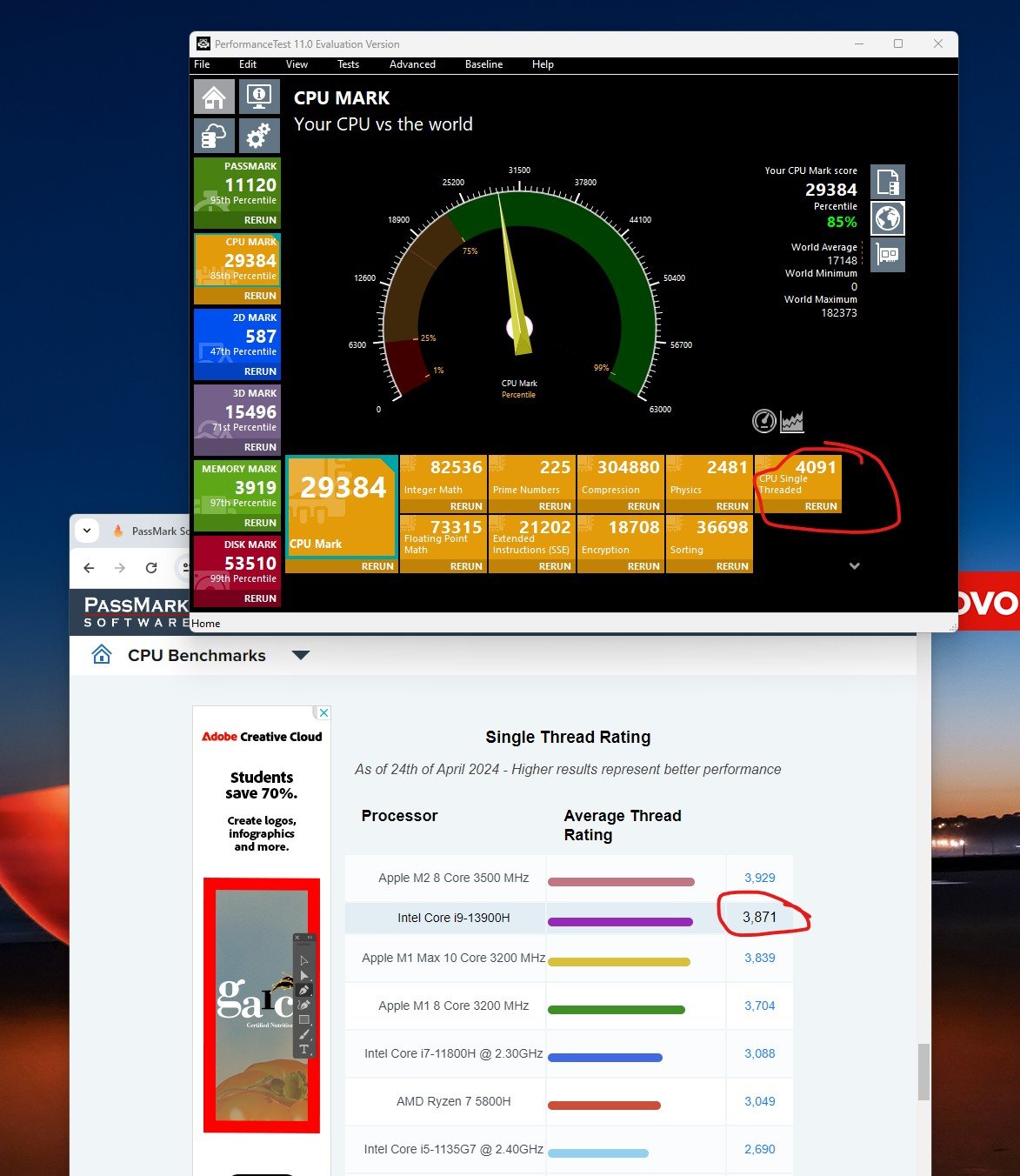
Might re-run under BIOS fan control and see if cranking the fans made any difference.
Re-ran under bios fan settings (fans audibly much slower).
Somehow it cranked out an higher benchmark score. Doesn't make sense to me, given the CPU seems to be thermally limited I would have thought slower fan's would mean a worse score....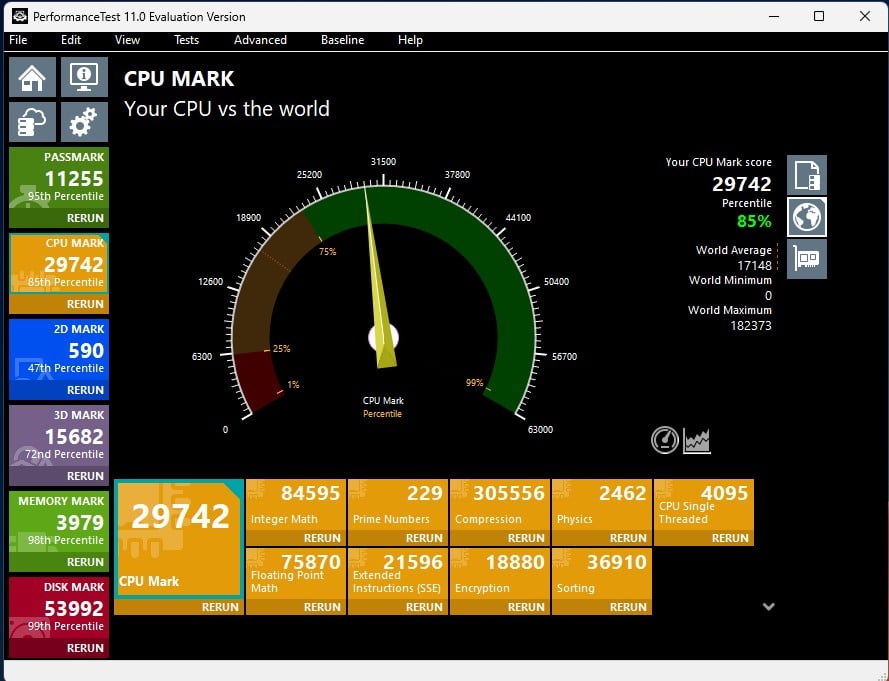
Has me sitting at 94th percentile for single thread CPU score. Can't complain about that given I am running a laptop...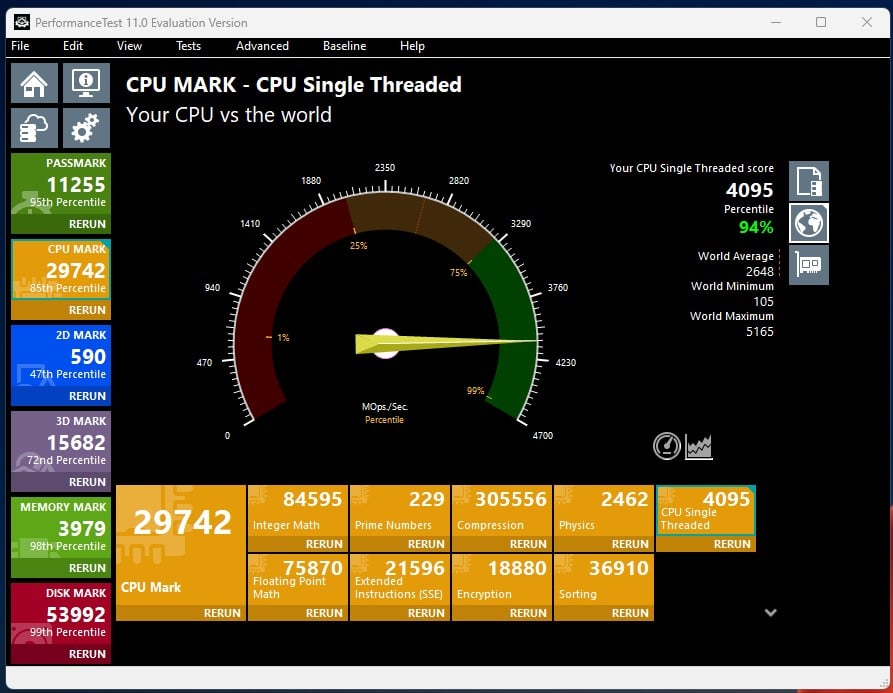
Note that I turned hyperthreading off in the BIOS (given I mainly care about single thread performance) which may have a negative impact on on multicore performance.
Hyperthreading turned on, BIOS fan management:
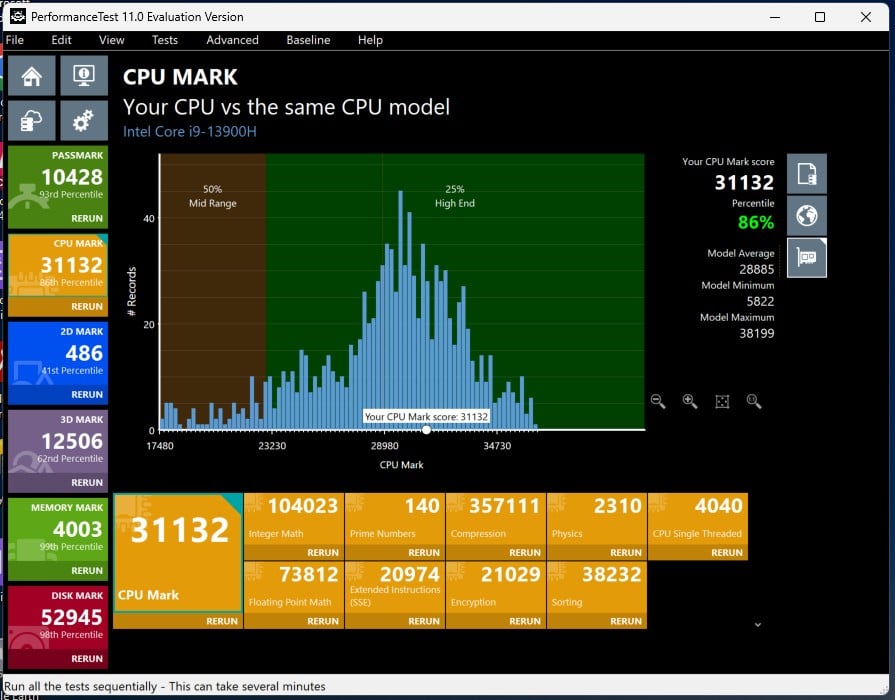
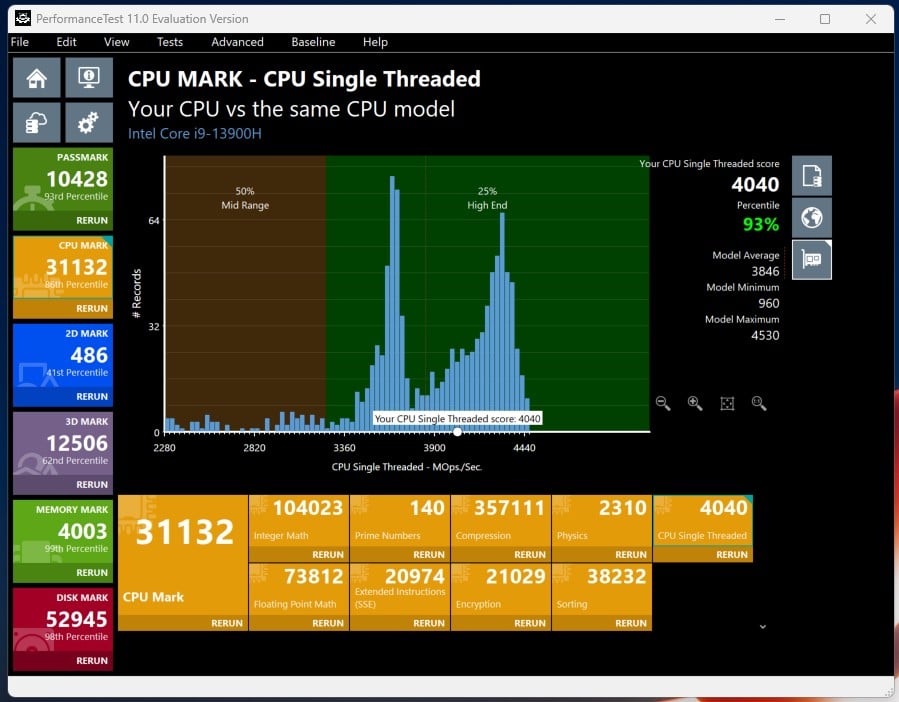
We might be getting into the noise / variability of benchmark results, but based on the above:
Hyperthreading off = 1.4% gain in single thread performance
Hyperthreading on = 4.7% gain in overall CPU mark score
Given I only really care about single thread performance I will likely turn it off again.
Interesting bi-peak distribution on the single thread performance in user results on the above graph.
And, just for fun, the results from my personal computer (a 2012 -2013 era Dell Precision Mobile workstation):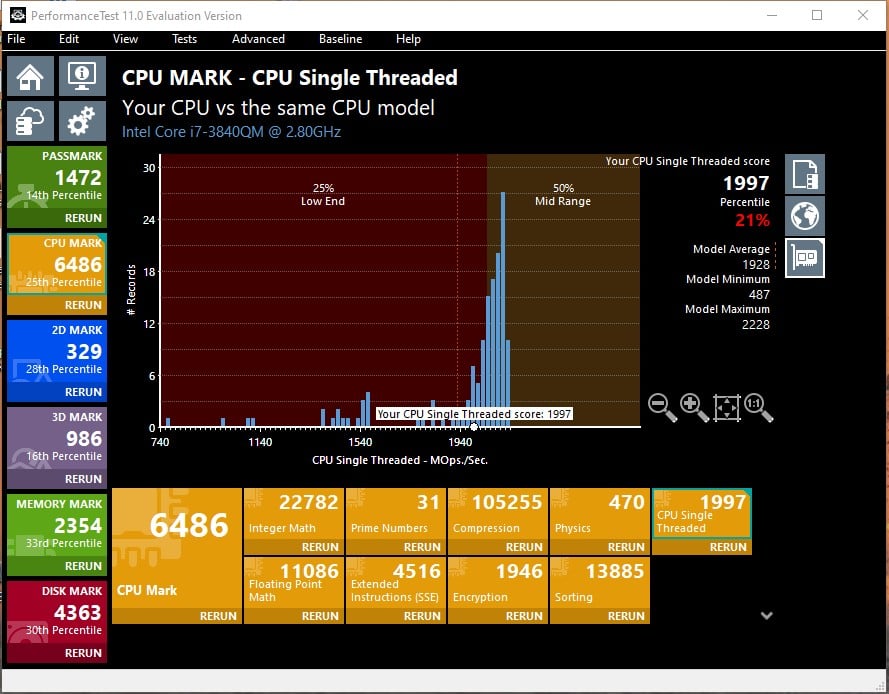
So my high end, new work mobile workstation outperforms my decade+ old personal one by:
~ 2x for single threaded CPU
~ 5x for general CPU
~ 10x for 3d graphics and Disk performance
Scott3:
Hyperthreading off = 1.4% gain in single thread performance
Hyperthreading on = 4.7% gain in overall CPU mark score
What is the point of turning off hyperthreading? You aren't getting a material (anything you would ever notice) increase in performance?
|
|
|
